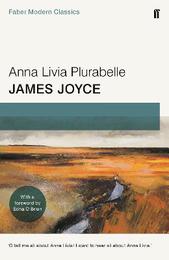
|
Anna Livia Plurabelle: Faber Modern Classics
Paperback / softback
Main Details
| Title |
Anna Livia Plurabelle: Faber Modern Classics
|
| Authors and Contributors |
By (author) James Joyce
|
|
Introduction by Edna O'Brien
|
| Physical Properties |
| Format:Paperback / softback | | Pages:64 | | Dimensions(mm): Height 198,Width 130 |
|
| Category/Genre | Classic fiction (pre c 1945) |
|---|
| ISBN/Barcode |
9780571333714
|
| Classifications | Dewey:823.912 |
|---|
| Audience | |
|---|
| Edition |
Main - Faber Modern Classics
|
|
Publishing Details |
| Publisher |
Faber & Faber
|
| Imprint |
Faber & Faber
|
| Publication Date |
2 February 2017 |
| Publication Country |
United Kingdom
|
Description
As James Joyce was working on Finnegans Wake, he asked his friend T.S. Eliot to shepherd an early extract, simply known as 'Work in Progress' into print. This celebrated episode, Anna Livia Plurabelle, was the first part of Joyce's extraordinary text to be published in England, printed in pamphlet form in 1930. It became the best-known section of Finnegans Wake, and one of Joyce's favourites; revised and published independently more times than any other piece. This new edition in the Faber Modern Classics series includes a new foreword by Edna O'Brien. 'His writing is not about something; it is that something itself.' - Samuel Beckett
Author Biography
James Joyce was born in Rathgar, Dublin, in 1882. In 1904 he and Nora Barnacle (whom he married in 1931) left Ireland for Trieste. Abroad, free from the restrictions he felt in Ireland, Joyce felt compelled to write of his native land, producing Dubliners (1914) and A Portrait of the Artist as Young Man (1916). During World War I, he lived in Zurich from 1915 to 1919, and in 1920 moved to Paris, where he spent most of the rest of his life. Towards the end of December 1939 James Joyce and Nora Barnacle left Paris for a small village near Vichy and ultimately settled in Zurich, where he died in January 1941. His major works, pioneering the 'stream of consciousness' style, are the novels Ulysses (1922) and Finnegans Wake (1939).
|